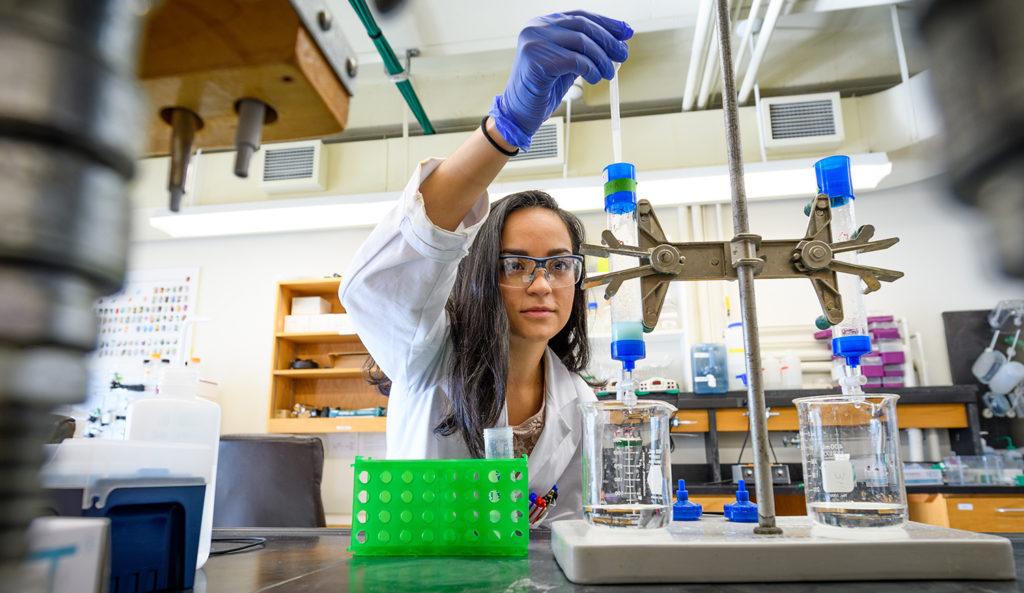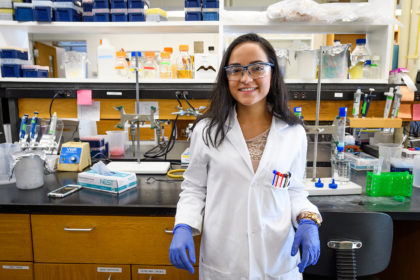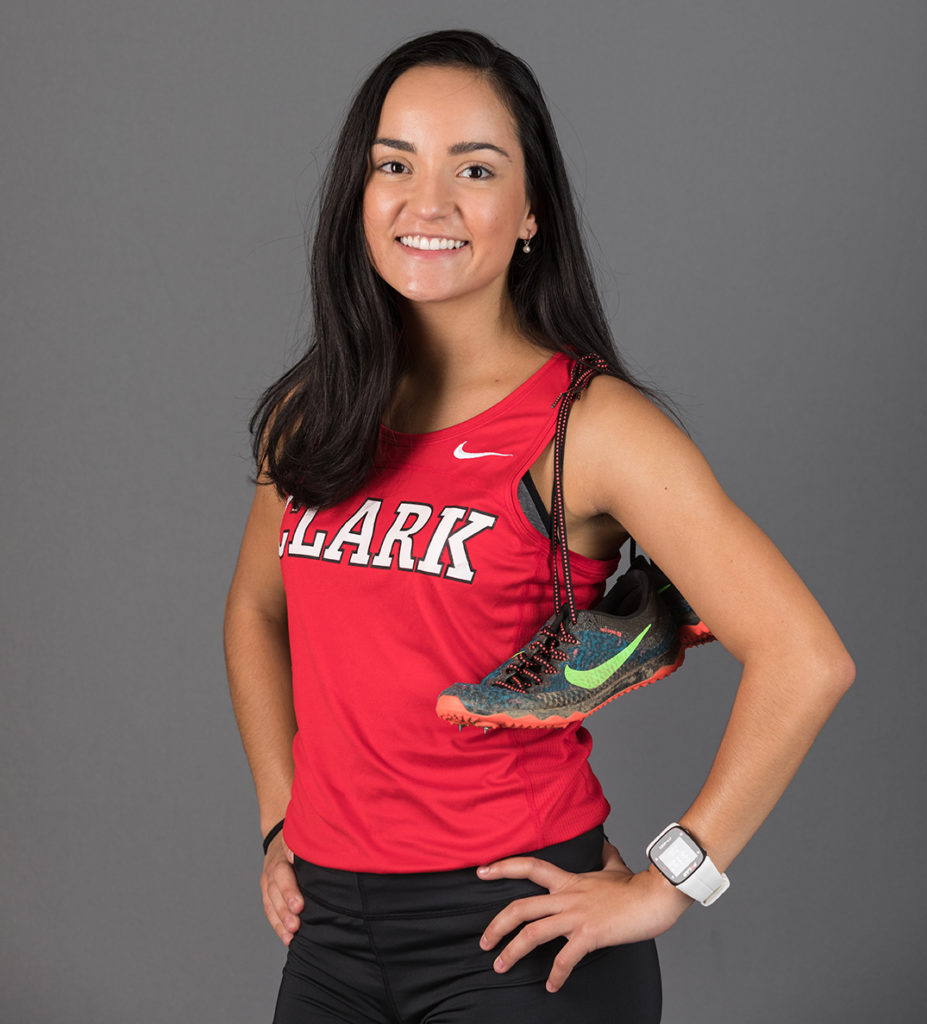Grandfather’s illness inspired her academic path in biochemistry and molecular biology

A biochemistry and molecular biology major in the Accelerated B.A./Master’s Program at Clark University, Diana Argiles Castillo ’18 will graduate this spring with a master’s degree, along with a résumé full of the skills and experience she gained by working with Professor Donald Spratt on protein research funded by the U.S. National Institutes of Health.
She hopes to land a job in the pharmaceutical or biotech industry, and also is open to eventually pursuing a Ph.D.
But Argiles Castillo’s interest in scientific research didn’t start with her desire to find a successful career. It started with something much more personal.
When she was in middle school in Alajuela, Costa Rica, her beloved grandfather was diagnosed with cancer, prompting her to research diseases and treatments.
“I was captivated by the work scientists do to create treatments, technology, and medications to help with cancer and other diseases, and was also very interested in learning how the human body works,” she recalls.
Argiles Castillo now hopes that her Clark degrees can be put to use in uncovering drugs and treatments for cancer, or for neurodegenerative diseases such as multiple sclerosis.

A Global Scholar who minored in management, Argiles Castillo received a fellowship through Clark’s Summer Science Research Program, allowing her to jumpstart her honors thesis research in her junior year. She graduated summa cum laude with highest honors for her bachelor’s degree and received the American Institute of Chemists Student Award in Biochemistry; she continues to work as a teaching assistant for Clark’s undergraduate Introduction to Chemistry lab.
But it hasn’t been all academics for Argiles Castillo. She ran on the women’s varsity cross-country team, making the NEWMAC Academic All-Conference Team; volunteered for Notre Dame Health Care’s Pediatric Palliative Care Program and Jeremiah’s Inn in Worcester; works for the International Students and Scholars Office; and served as the policy and practice coordinator for Clark’s Student Sustainability Fund, which initiated water bottle filling stations and compost/recycling bins around campus, and a new improved irrigation system to save water.
We asked Argiles Castillo about her experience at Clark.
Describe the research you are conducting in Spratt’s lab.
We study a group of proteins involved in the ubiquitination pathway called the HECT E3 ligases. This pathway is found in almost all tissues of eukaryotic organisms and is important for the normal functioning of our bodies. The proteins we study are in charge of tagging other proteins with a small protein called ubiquitin, leading to protein degradation and other types of cellular events involved in processes such as DNA repair, the cell division cycle, and gene expression. When something goes wrong in this pathway or with the function of these proteins, disease can occur. Specifically, the protein I study, called HACE1, has been implicated in Huntington’s disease and Wilms tumor, the most common type of childhood kidney cancer.
How might this experience help you with your post-college goals?
It has given me invaluable practice with various techniques that are widely used in industry to express, purify, and test proteins that can be used for biomedical research. It has also allowed me to experience hands-on research and realize that this is my passion.
What other experiences have you had at Clark?
My first summer, I completed an internship in the Microbiology and Parasitology Department at the Universidad de Ciencias Médicas (University of Medical Sciences) in Costa Rica, where I studied the effect of various plant extracts on malaria in mice tissue.
At Clark, I also was part of Dr. Justin Thackeray’s lab in the Biology Department, where I completed a LEEP project.
Last summer, I received a generous stipend from AbbVie, the pharmaceutical company located in Worcester. I was able to further enhance my research and get data for my master’s thesis.

How has your time at Clark prepared you for future experiences?
Being part of the cross-country team and working in Dr. Spratt’s lab definitely taught me how to be a team player and work with others to achieve a common goal. As a Global Scholars coordinator and a senior student in the lab, I’ve enhanced my leadership and communication skills. I’ve learned how to resolve issues in the most appropriate way and how to dialogue with my peers and superiors in a respectful manner to have a working environment that is suitable for everyone.
Dr. Spratt is a great supporter of teaching students how to be better public speakers. He helped me become better at explaining my scientific research by participating in the Summer Science Research Program series, Fall Fest, Academic Spree Day, and admissions open house sessions.
What do you like best about being a student at Clark?
The people I’ve met along the way. I like that you are able to get to know your professors, and that most of them always have an open door and are willing to chat with you anytime. Clarkies are also very motivated and passion-driven, and will do whatever it takes to achieve their goals. It is very inspiring to be surrounded by such enthusiasm and positive attitudes.
What do you like best about studying biochemistry and molecular biology?
Research is very exciting; you never know what to expect. Things could go really well and be a success, or they could go wrong, and I have to start all over again. Either way, it’s a learning experience, because I have to think thoroughly about what went right or wrong, and what the next steps are. It keeps the momentum going, and I like the thrill of it, even though some days I have to be in the lab for eight-plus hours.
What’s different about studying your major at Clark versus other universities?
Being a small school, Clark gave me the chance to start hands-on research as a sophomore and master various lab techniques before I even graduated. Most schools do not let students join labs until they are a junior or senior, and are also very competitive. I think most professors at Clark are willing to let students into their labs as long as they show effort and work hard. I also believe most professors are very enthusiastic about teaching and doing research, and are genuinely interested in helping students succeed and become better scientists, and that is very motivating.
How have your faculty advisers helped you?
My current faculty adviser is Dr. Spratt, but my undergraduate adviser was Dr. Thackeray. Both professors have guided me toward the path I want to take in life. They both know I’ve always been interested in pursuing a Ph.D. and in working in biomedical research, and have offered me advice about what steps I should be taking. Dr. Spratt has also been a great mentor in the lab and has taught me to dig deeper and always ask questions.
Are there other professors who have inspired you?
I have a great appreciation for Dr. [Mark] Turnbull, my organic chemistry professor. I had never struggled with a course so much until I took “Orgo.” Dr. Turnbull is a tough professor, but only because he wants us to think deeper and be able to solve problems in a quick and efficient manner.
When I was struggling, I went to see him, and he was willing to help me and also took the time to get to know me as a person, which made me feel more welcomed in a time when I was going through a culture shock. He appreciates students who put in the effort, and he genuinely wants us to succeed. I truly admire him for that.
How has your time at Clark helped prepare you for the workforce?
Not only have I learned lab techniques that will be useful when applying to jobs, but I have also learned more about myself and what I want to do in the future.
No matter where I end up, I know I want to do something I love and help people. Clark has taught me that with motivation, hard work, and a positive mind, I can achieve that.


